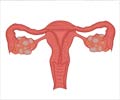Explore how polycystic ovary syndrome is associated with cognitive decline and lower white matter integrity in the brain.
- Polycystic ovary syndrome (PCOS) is linked to lower memory and cognitive skills
- Women with PCOS have lower white matter integrity indicating early signs of brain aging
- PCOS's impact on cognitive health emphasizes the importance of holistic health management
A new research published in Neurology suggests that individuals with polycystic ovary syndrome are more prone to experiencing memory and cognitive issues in middle age (1✔ ✔Trusted Source
Associations of Polycystic Ovary Syndrome With Indicators of Brain Health at Midlife in the CARDIA Cohort
Go to source).
What is Polycystic Ovary Syndrome?
Polycystic ovary syndrome is a hormonal condition that affects women of reproductive age. It usually starts during adolescence, characterized by hormonal imbalances, irregular periods, excess androgen levels, and cysts in the ovaries.PCOS can also cause excess hair growth, acne, infertility, and weight gain.
Individuals with PCOS may exhibit lower memory and cognitive skills, along with subtle midlife brain changes, potentially influencing various aspects of life, including quality of life, career success, and financial security.
Did You Know?
Worldwide, approximately 8–13% of women in their reproductive age are affected by Polycystic Ovary Syndrome. Among them, up to 70% remain undiagnosed.
Navigating the Link Between PCOS and Brain Function
The research involved 907 female participants, aged 18 to 30 at the study's commencement, followed over 30 years. Assessments measuring memory, verbal abilities, processing speed, and attention were conducted.Results revealed that women with PCOS scored approximately 11% lower on average compared to those without the condition. After adjusting for age, race, and education, individuals with PCOS exhibited lower scores in memory, attention, and verbal abilities.
Brain scans at years 25 and 30 involved a subset of 291 participants, including 25 with PCOS. These scans assessed the integrity of white matter pathways by examining the movement of water molecules in the brain tissue. Researchers observed lower white matter integrity in individuals with PCOS, indicating potential early signs of brain aging.
Read More to Know About ‘PCOS Diet: Managing Symptoms Through Nutrition’
Unlocking the Cognitive Impact of PCOS
Dr. Huddleston emphasizes the need for further research to validate these findings and explore ways to mitigate thinking and memory problems in individuals with PCOS. She suggests that lifestyle changes such as increased cardiovascular exercise and enhanced mental health could potentially contribute to improving brain aging in this population.A limitation of the study was that PCOS diagnoses were not made by a doctor but relied on androgen levels and self-reported symptoms, potentially affecting the accuracy of participant’s information recall.
In conclusion, polycystic ovary syndrome can be associated with lower memory and cognitive skills. This underscores the potential significance of addressing both physical and mental health aspects in individuals with PCOS for overall well-being.
Reference:
- Associations of Polycystic Ovary Syndrome With Indicators of Brain Health at Midlife in the CARDIA Cohort - (https://www.neurology.org/doi/10.1212/WNL.0000000000208104)
Source-Medindia
















